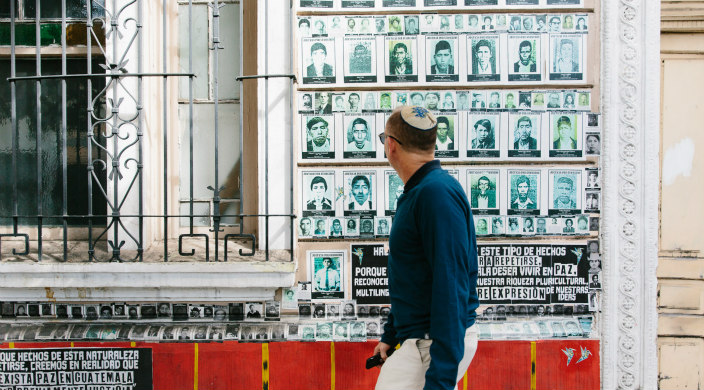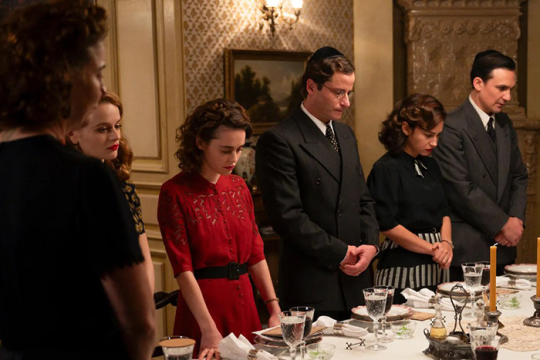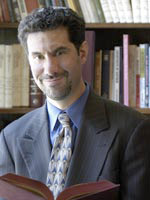
During an intense week in January, I traveled around Guatemala, learning about good people in a dire situation. I met human rights workers, whose efforts are criminalized; midwives, whose skills go unrecognized; women’s rights activists, whose protests are marginalized; journalists, whose reporting is trivialized; and survivors of forced eviction, whose very right to exist has been jeopardized.
I traveled as part of a group of 15 U.S. rabbis who are spending a year learning about poverty, human rights, and justice as we study these issues through the perspective of Jewish values and advocate for the rights of some of the world’s poorest and most oppressed people. We are Global Justice Fellows* with American Jewish World Service (AJWS), a leading Jewish organization working to promote human rights and end poverty in the developing world.
Throughout this journey, we heard many heartbreaking yet inspiring stories, but perhaps the most moving story came from someone I’ll call Hector.
In 1982, as a child, Hector watched helplessly as his mother, grandmother, and four siblings were killed in a massacre that targeted the Maya population. The Guatemalan army suspected some in Hector’s village of supporting guerilla fighters. With his father and his brother, Hector fled to Mexico, eventually returning to Guatemala to rebuild his community and become a human rights attorney.
Listening to Hector’s story, I recalled Elie Wiesel, who, as an adolescent, survived Auschwitz, where members of his family were murdered. Like Wiesel, Hector has overcome multiple traumas and devoted his life to bearing witness for the dead while demanding justice for the living.
Many of us in North America live in an increasingly global state, keenly aware of the rest of the world – and yet, most of us have little idea what is happening in Guatemala, even as we see news stories about Central Americans seeking asylum in the United States.
In short, here’s the situation in that country (which is the size of Kentucky, where I live): Guatemala’s governing forces are oppressing anyone who is seen as a critic of President Jimmy Morales. Those in power are trying to protect reckless leaders. Legislation proposed in Guatemala’s congress would end culpability for war crimes and human rights abuses during a decades-long armed conflict; they want to limit non-governmental organizations that are working to stabilize civil society.
While we were in the Guatemalan capital, thousands of people came out to protest the policies and direction of the current government. Morales had just expelled a commission that is investigating corruption in the country – the International Commission against Impunity in Guatemala, funded by the U.N., the United States, and others. For a decade, the group has worked with Guatemalan justice agencies to target corrupt officials.
I couldn’t help but think of Rabbi Joachim Prinz, who fled Nazi Germany for the United States, where he became a champion of human and civil rights. American historians also know him as the last person at the lectern before Rev. Dr. Martin Luther King, Jr., King gave his famous “I Have a Dream” speech. Setting the stage for the greatest moment in American oratory, Rabbi Prinz preached these words:
“In the realm of the spirit, our fathers taught us thousands of years ago that when God created man, he created him as everybody's neighbor. Neighbor is not a geographic term. It is a moral concept. It means our collective responsibility for the preservation of man's dignity and integrity.”
Prinz’s argument is rooted in biblical and ethical ground: “Love your neighbor as yourself” is not followed with a string of caveats permitting a lower standard of behavior toward Benjaminites, Reubenites, anyone who ever lived in Simeonite territory, or ever had financial dealings with Levites.
Today, the chaos and cruelty that sends thousands of desperate families fleeing to our southern border cannot be solved by categorizing people as either countrymen or alien. Rabbi Prinz implored us to think of “neighbor” not as a term delineated by boundaries, but a moral construct defined by brotherhood.
It’s time we stop treating refugees like criminals and come to love our neighbors – in Guatemala and beyond – as ourselves. We cannot close our eyes or wall out the collective responsibility we have for one another.
The preservation of dignity and integrity, to use Rabbi Prinz’s phrase, call us to action.
*Other Reform rabbis on the trip included: Rabbi Dean Shapiro, Temple Emanuel of Tempe, AZ; Rabbi Jessica Zimmerman-Graf, Congregation Sherith Israel in San Francisco, CA; Rabbi Jill Perlman, Temple Isaiah in Lexington, MA, Rabbi Philip "Flip" Rice, Congregation Micah in Nashville, TN; Rabbi Sharyn Henry, Rodef Shalom Congregation in Pittsburgh, PA; Rabbi Susan Talve, Central Reform Congregation in St. Louis, MO; Rabbi Eric Solomon, Beth Meyer Synagogue in Raleigh, N.C.
Find out more about American Jewish World Service’s Global Justice Fellowship, an opportunity to learn about resistance and resilience from activists in the developing world, and discover the links between local and global issues. This selective six-month program – which includes international travel, advocacy, and online seminars – is designed to train and inspire American rabbis to be skilled advocates for human rights who can embody the Jewish vision of a more just world for all.
Related Posts

“We Were the Lucky Ones:” Bringing The Holocaust Out of History Books and Into Our Homes

Harnessing the Power of our Mothers Around the Seder Table


